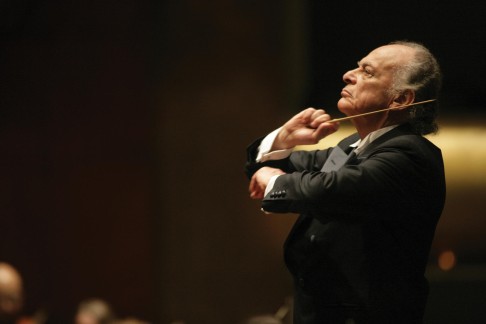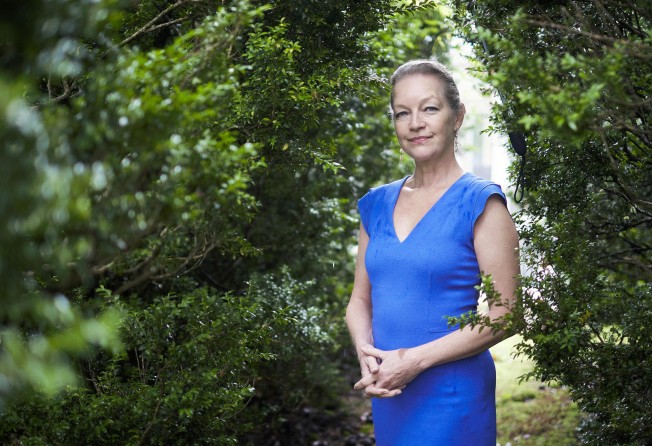
Lorin Maazel's widow picks up his artistic director baton

Dietlinde Turban Maazel, 57, has played a number of roles: actress, wife, home-schooling mother. Last year, her husband of 31 years, the conductor Lorin Maazel, died of a rare autoimmune disorder during the annual Castleton Festival, a training ground for young conductors, instrumentalists and singers that he founded and funded with her on their 240-hectare Virginia estate in 2009. Now Dietlinde Maazel, the widow, has taken over an institution that has become her husband's legacy. This year's edition will run through to July 19.
"The board suddenly had to step up to being quite an active board," she says, "because I don't have those funds any more. I'll be lucky if I can just keep all of this afloat."
Dietlinde met Maazel at the Bambi Awards, Germany's answer to the Academy Awards, in 1983. For the next three-plus decades, she followed his vision. "He kept saying, 'Don't walk away from your career,'" she says, "but I didn't want [it to be]; he is here, I'm there, and the nanny is with the kids somewhere else."
Maazel's vision brought them to Virginia, a state he had vowed to settle in when he first saw it as a student. It led to the construction of a small theatre in a building that was originally a chicken house, where the family began hosting performances by the likes of Mstislav Rostropovich - who inaugurated the theatre in 1997 - and Yefim Bronfman, James Galway and, of course, Maazel on violin.
And it led to the establishment of a summer opera festival in 2009. It wasn't long before Maazel erected a tent, and then a permanent structure, so he could move from chamber opera in the home theatre to what Dietlinde calls "the big 10", including Puccini's Trittico, La Fanciulla del West and La Boheme.

Dietlinde played a role in all of this. But to the outside world, it wasn't always clear what it was. Nancy Gustafson, the soprano, was the festival's general director; Dietlinde, though a co-founder and a member of its leadership team who took on teaching and acting roles, had no clear title. "With such a giant personality and leader upfront," she says, "I was always a little bit the Japanese wife, one step behind."
But then Maazel died.
"When the cat leaves the house the mice are dancing, and that happened a little bit," Dietlinde says. "Everybody had sort of a different type of ownership where they wanted [the festival] to go, and it got a little confusing. And so a core of the board just asked me to take on the leadership. They said, 'You can do it, and we want you to be the face of the festival and step up'. I must say when you suddenly have to, then you can."
Stepping up to the plate has been a theme of Dietlinde Maazel's life ever since, at age 19, she accosted the actor and director Michael Degen backstage in a Munich theatre, asked him how to go about getting a role. She ended up getting cast as Gretchen in Goethe's Faust. It was the start of a meteoric career that was notable for its eclecticism in a country that makes a sharp distinction between high art and entertainment: Dietlinde appeared in plays by Schiller, in feature films, in TV thrillers and on the covers of virtually every TV magazine and tabloid in the country.
I had done so much so quickly, I didn’t feel I had life to fill it
She was only 26 when she met Maazel and walked away from all of it.
"I had done so much so quickly, I didn't feel I had life to fill it," she says. "You need a database of life and emotions in order to be a good actor. Otherwise, you kind of repeat yourself or just exteriorise it and become like a lot of the Hollywood starlets, basically a photographed model. And that was never my intention. I was so hungry just to live a little."
She wasn't afraid to stand up to her strong-willed husband. She insisted on children, though he, who already had four children with his first two wives, wasn't sure. And she held her own with him in discussions about music.
She remembers an episode during work on the Andrea Bocelli album Sentimento (2002), for which he orchestrated Tosti songs and played the violin himself.
"It's a delicious recording," she says, "but it came back, the first draft, from London, and we listened to it, and I thought, 'I don't like that' because it was done with the pop sound. Bocelli was totally upfront, and the rest was a soup in the background. And he, such a critical ear, but he was just, I think, into the music, and he said, 'Isn't his wonderful'. And I said, 'No, darling, you're going to send that right back and they're going to remix the whole thing, because it's awful'. And he got [into] one of his tempers, slammed the door and was not to be seen for half a day.
"The next morning, I heard him getting up very early, listening to it again, and then he came to me in the kitchen and he said, 'You are damn right. We're going to send this right back to the drawing board.'"
She was in part backed up by her own training as a violinist - something she concealed from her husband until after they were married. One day when she thought he wasn't home, she picked up the instrument again - much to Maazel's shock; Dietlinde had at one point actually considered a solo career.
Taking over a struggling private festival calls on another skill set. Like another area festival, Wolf Trap, in the wake of the 1994 death of its charismatic patron and founder, Catherine Filene Shouse, Castleton is rapidly professionalising.
"It became apparent that we had to begin a tighter managing style," Dietlinde says. "When you have the visionary and the funder in one package, then you can say, 'OK, he wants 30 more chorus people, that means 30 more costumes, 30 more people living somewhere and eating somewhere, but he wants that for his sound, and if he pays for that, we just make it happen.'
"Now, we've become much more professional overnight, in that sense. Because there's much more transparency, there's a responsibility before the board, there's a budget - that I've brought down by a million; we're now a US$2 million festival and not a US$3 million festival."
This is not all a bad thing. The orchestra, true, is smaller this year. But the organisation has improved. Dietlinde Maazel is now thrilled by the festival's new professionalism and filled with ideas as ambitious and sometimes idealistic as her late husband's.
"My last dream," she says, "would be to turn this into a year-round academy" - something her late husband certainly never envisioned.
As for a return to acting: "Well," she says, smiling, "you never know".
The Washington Post